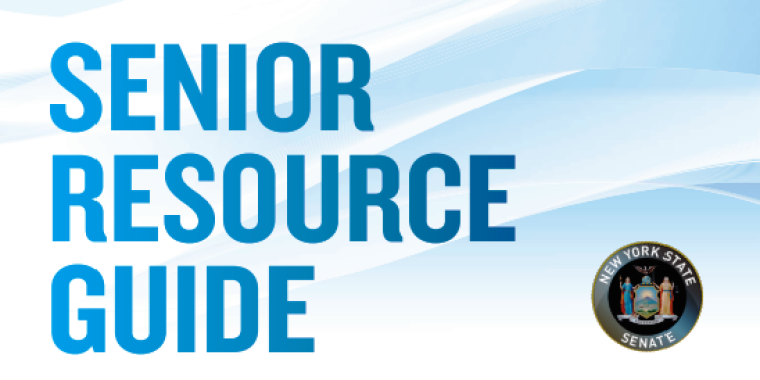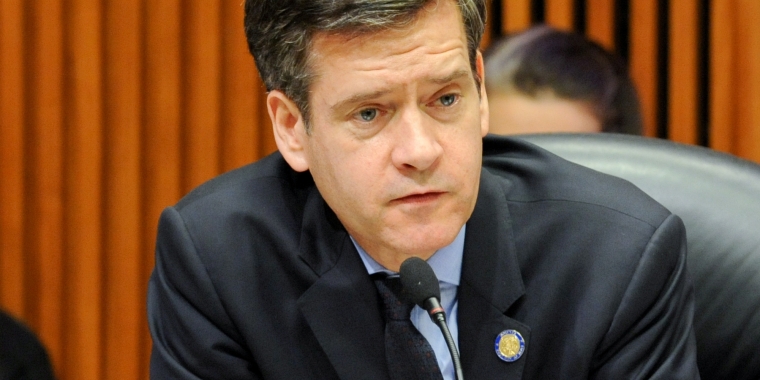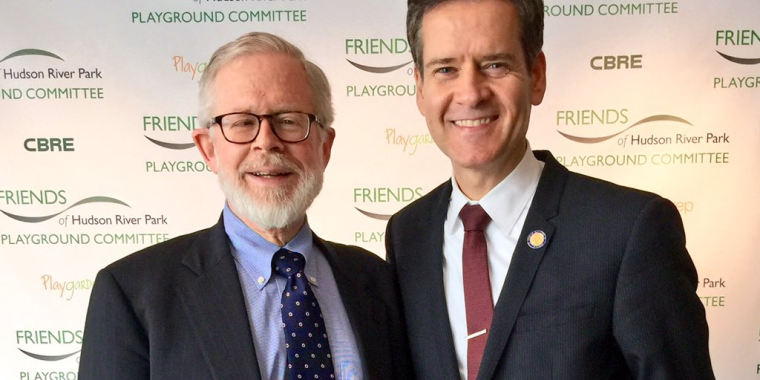
Letter to Speaker Adams on Protecting our Environment and the CACP
Senator Brad Hoylman-Sigal
September 17, 2024
-
ISSUE:
- vehicle idling
- Environment
- Clean Air

Dear Speaker Adams:
I write to urge passage of two important bills that build on the Council’s strong record of protecting our environment by creating and nurturing the Citizens Air Complaint Program (“CACP”). Intro. 5 (CM Avilés) and Intro. 291 (CM Menin) are both set for hearing before the Committee on Environmental Protection, Resiliency, and Waterfronts on September 18, 2024. As you know, these bills enjoy cosponsorship from a supermajority of the Council—as did identical bills last session—and I hope they move to a vote. In addition, I have concerns, however, about Intro. 941, which in my opinion would undermine both the CACP and the First Amendment.
In 1972, the Council enacted New York’s City’s Air Code, which specifically encouraged citizens to report violations through the CACP. But city agencies failed for decades to enforce the law against illegal engine idling, or to publicize the CACP. Today, New York City has the most successful citizen enforcement program in the world. Five years ago, the Council wisely passed Local Law 58 of 2018, requiring the Department of Environmental Protection (“DEP”) to publicize and provide guidance on the idling law and to reward a fair 25% share to citizens whose reports result in violations paid by polluters. The CACP has quickly become the single-most effective means of enforcing the City’s Air Code.
In 2023, citizens submitted over 86,000 complaints against illegally idling trucks and buses—up from just 16 in 2018 before the Council acted. Video-backed citizen-based summonses are more effective, with a lower dismissal rate, than summonses originated by city agencies, and they have resulted in large companies dramatically modifying their behavior. Ordinary citizens’ complaints have contributed nearly $50 million to the City treasury, more than paying for the CACP.
Sadly, there are still far too many barriers to entry for this program. DEP has imposed complicated rules on citizens, which it changes constantly and with no opportunity for public comment. Stopping illegal idling should be as simple as a citizen seeing a violation, recording a video, and sending it to the DEP to issue a ticket.
As you well know, air pollution disproportionately hurts New Yorkers of color. Minority communities in New York inequitably bear the highest exposure to toxic transportation emissions, especially particulate matter from vehicles such as unnecessarily idling commercial trucks and buses. New Yorkers of Latin descent are exposed to 81% more vehicle pollution than white residents, and African Americans to 72% more. Incredibly, Asian American residents are exposed to twice as much particulate pollution as white residents. As the City recognized in 2020, high levels of fine particulate matter, nitrogen dioxide, and nitric oxide are still found in areas of high traffic density, including the South Bronx, Western Queens, and Northern Brooklyn. My own constituents, including in traffic-dense Hell’s Kitchen, home of massive emissions from the Port Authority Bus Terminal and surrounding traffic, likewise suffer a disproportionate share of the burden of air pollution. Intros. 5 and 291 will lessen this injustice, while Intro. 941 will make it drastically worse.
DEP locks out all New Yorkers from the CACP unless they submit their complaints in English. Indeed, DEP’s website still specifically states that all complaints must be submitted in English. All New Yorkers have lungs and need to breathe clean air, regardless of the languages they speak. All New Yorkers also have a Right to Clean Air under the New York State Constitution. I hope the Council passes Intro. 5, which will
require DEP to accept complaints in all city-wide languages, and end the DEP’s discriminatory and unconstitutional policy.
Currently, large companies like ConEd, Verizon, and Amazon still do far too much illegal idling. No company should treat a fine like a simple cost of doing business. That’s why in my opinion the Council should pass Intro. 291, which will raise the current idling penalties to a level that will deter giant corporations from harming New Yorkers.
Intro. 941 would erode New York’s clean air gains and discourage citizen participation. Unfortunately, Intro. 941 would open new loopholes for the first time since the Council passed the Air Code in 1972. It would drive up pollution from buses and trucks, while imposing new restrictions on citizen participation—when we should be opening this program up to more people. As shown recently in New York Magazine, the bill also punishes citizens who complain about air pollution—or the DEP’s handling of it—based solely on their speech. Incredibly, Intro. 941 would let DEP ban any citizen it doesn’t like, just by claiming she didn’t act in a “dignified, orderly, and decorous manner” or failed to “demonstrate familiarity with [DEP’s] rules.” The First Amendment means that the government cannot pass laws like Intro. 941 that chill free speech by banning criticism and requiring citizens to speak in lockstep with government agencies’ official positions. Every New Yorker should participate in the CACP, not just those selected by DEP, or those with a particular government-approved viewpoint.
I humbly request that the Council acts to protect our environment and the CACP by voting on Intros. 5 and 291 as soon as possible and rejecting Intro. 941. Thank you and your colleagues for your consideration of this request and stellar service to New Yorkers.
All best regards,
Brad Hoylman-Sigal
State Senator – 47th District
Share this Article or Press Release
Newsroom
Go to NewsroomHoylman Senior Resource Guide
February 18, 2016


HUDSON RIVER PARK NEEDS INCREASED FUNDS IN STATE BUDGET, LAWMAKERS SAY
February 18, 2016

